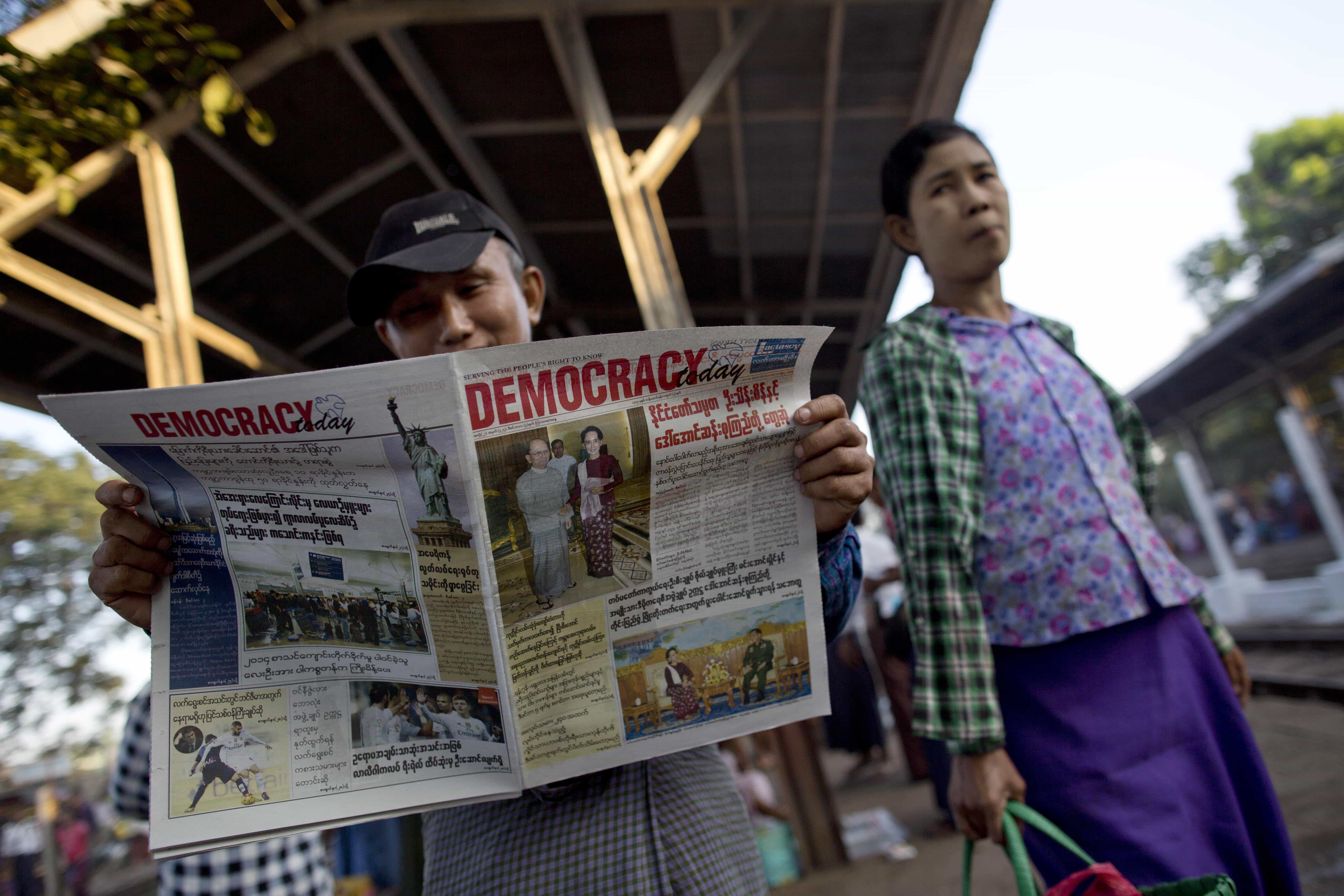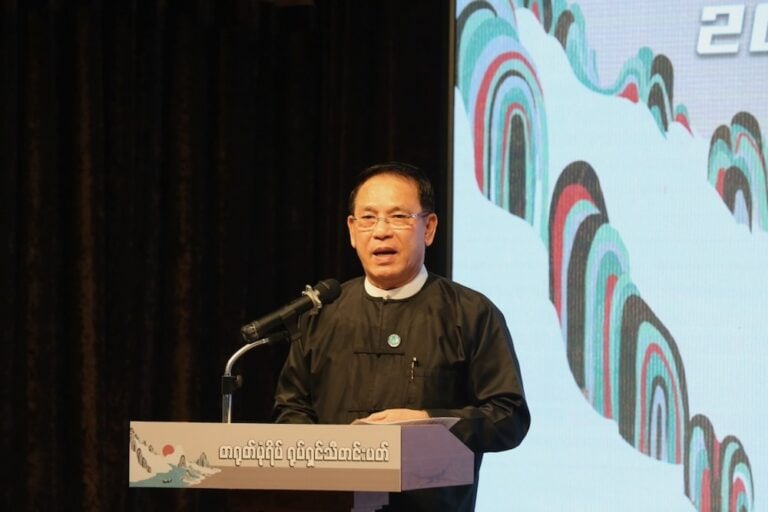After half a century of military rule, there is no official recognition of the public's right-to-know in Burma. Presently, any individual attempting to access state information receives a response of blunt-denial or even punishment.
This statement was originally published on seapa.org on 3 December 2015.
There is still no hint of official recognition of the public’s right-to-know in Burma, after half a century of military rule. Presently, any public or individual attempt to access state-held segments of social, economic and political information receives a response of blunt-denial or, very likely, a backlash of punishment.
‘Incommunicado’ is the normal mode of state response that the public can expect in the exercise of their right to freedom of information under the ruling government. Legal protection for those who claim this right to accessing information is not guaranteed in any case. Also, public information is sealed off as exclusive state property and guarded tightly to shield the interests of a privileged few.
Following the previous 2010 elections, restored civil liberties and press freedoms fueled the demand for the public’s right-to-know, but the confines of civic space and debate quickly became evident, and momentum also ultimately dropped off.
This time, given the dramatic political changes heralded by the recent 8 November elections, it is expected that the general public will have a chance to seek information that matters in their lives without personal risk.
Country context
As a member of the Association of Southeast Asian Nations (ASEAN), Burma is also gearing up to embrace the ASEAN Community, which takes effect at the end of 2015.
In the past 20 years, only two ASEAN countries adopted national FOI laws. Even then, there is a gap, in both Thailand and Indonesia, in implementing their FOI laws.
The rest of ASEAN still lags behind in the global shift towards the free flow of information, as a core value in democratic governance. Despite the demands and desires of national and regional civil society, many countries in the region, including Burma, still refuse to empower their own people through better access to information that matters in their life.
Burma, officially known as Republic of the Union of Myanmar, is comprised of seven states and seven divisions. Consecutive ruling juntas have ruled the country through harsh, centralised modes of national governance. Various ethnic groups have waged armed insurgencies in a bid for improved federal autonomy since the country gained independence in 1948. As a result of the various conflicts, its isolationist policies and the repression of human rights and democracy have stunted nationwide development – a constant challenge for the country of 52 million.
The current constitution was drafted by the military government in September 2008, which is the country’s third constitution since independence from the British. As a parliamentary republic with a bicameral legislature, 25 percent of the legislature is reserved for appointed representatives of the military personnel. Despite the relaxation of civil liberties and press freedom since 2011, the country’s outdated and draconian laws are still in place and practiced as to deter any attempt to access information.
One quest echoes for many
Ma Thandar was recently elected in the 8 November elections in Einme Township of the Irrawaddy Delta under the banner of Aung San Suu Kyi’s National League for Democracy (NLD). Her choice to represent the marshy town of the Delta in the National parliament is a triumph of aspiration for public service for the respected activist and former political prisoner.
Prior to campaigning for elections, Ma Thandar has been seeking justice and information on the killing of her husband in 2014 while in military custody. Her husband Aung Kyaw Naing, a.k.a. “Par Gyi”, was a freelance journalist, reporting on armed-conflict related news for the various Rangoon-based publications.
While on a reporting trip to Mon State, southern Burma in September 2014, Aung Kyaw Naing was apprehended by the military, and days later was shot to death. The military claimed that he was a liaison officer for the Karen Benevolent Army, an ethnic armed group. The army announced his death with a letter to the country’s Interim Press Council weeks after his death, saying he tried to escape.
Since then, Ma Thandar has launched unflagging efforts to seek justice and answers from the responsible authorities on the untimely death of her husband. Thus far, she has been unsuccessful.
A death inquest was opened, but Ma Thandar and her lawyer were not informed or invited to any hearings for several months.
Initially, two soldiers were linked to the crime and a later court verdict in Mon State ruled that the journalist was shot to death. The ruling failed to name anyone responsible. Subsequently, the Myanmar National Human Rights Commission (MNHRC), discovered that the two soldiers had been already been acquitted by the Martial Court:
“As it was affirmed that the death of Ko Aung Naing (a) Ko Aung Kyaw Naing (a) Ko Par Gyi occurred during the period of active service, it came within the jurisdiction of the Court Martial under section (72) of the Defence Services Act. Accordingly the case was heard by a Summary General Court Martial as Case No (146/147) under the provisions of the Defence Services Act 1959, the Code of Criminal Procedures and the Rules and Procedures of the Court Martial and an order of acquittal was passed on two guard soldiers of (210) Light Infantry Regiment namely Lance Corporal Kyaw Kyaw Aung and Private Naing Lin Tun under section 71 of the Defence Services Act and section 304 of the Penal Code. The order was upheld by the Commander of the Southeast Command, it was learnt.”
The MNHRC had endorsed “for attainment of the fundamental rights of the citizens and also for transparency in the eyes of the public, [that] this case should be tried in a civil court”.
The ruling prompted Ma Thandar to send an objection letter to the defence minister and commander-in-chief. However, the chances of receiving any reply from either recipient is very slim.
MNHRC’s statement also included information from the Ministry of Defence affirming that the case was held according to the 2008 Constitution, the Code of Criminal Procedures and the Defence Services Act. A reference to the section 304 of the Code of Criminal Procedure implies that a person cannot be retried for the same offence. Hence, the civilian jurisdiction is not likely be to pursued for the case anymore.
Ma Thandar’s quest for justice and information about her husband’s death has not been answered yet. Her attempt of the right to know mirrors the current states of transparency and accountability in Burma. Her grief and pain is also shared by so many others, whose inquests for their lost loved ones have also not been resolved yet.
In the name of national security
Burma’s over-broad and vaguely-defined national security laws are often applied to bar any attempt to access information of public interest. Harsh penalties are time and gain pronounced to set examples to discourage possible future attempts. The presence of at times overlapping provisions of these laws restricts the right to freedom of expression, including access to information. Thus, it is of vital importance to push for reform in these legislations in accordance with dignity and respect for human rights.
Recently, one of these laws was applied against newspaper owner U Tin San for authorising his reporters to access, take pictures and file an investigative report on an alleged chemical weapons facility belonging to the army. The report was intended to raise public interest based on the fact that Burma is a signatory of the Chemical Weapon Convention (CWC), but has not yet ratified the agreement.
Tin San and four journalists were sentenced to 10 years of imprisonment with hard labour on 28 August 2014. They are still behind bars, even though their sentences have been reduced to seven years after appeals.
The law in this case – section 3 of the Official Secrets Act – was enacted in 1923 when Burma was still a British colony. This law was patterned after the British Official Secrets Act of 1911, targeting at espionage of rival foreign countries, which is irrelevant under Burma’s current context, and not to mention for its application to local journalists. In this case it was applied to persons suspected of being a threat to national peace and security.
Until August 2012, Burma’s censorship bureau – the Press Scrutiny and Registration Division under the Ministry of Information – had absolute authority to block and bar any publication deemed as an impediment to the State’s peace and order. The censorship body held sway for nearly five decades since the enactment of the Printers and Publishers Registration Law introduced after the 1962 coup d’état.
The abolition of the PSRD in 2012 heralded the relaxation of the country’s media environment.
Rights and restriction in new laws
The News Media Law, drafted by the interim Press Council, was enacted in March 2014. It was hailed by the state-owned press as opening a new framework for freedom of press and access to information.
Many have also expected the new law to replace the repressive 1962 Printers and Publishers Registration Law. But, much to the dismay of observers, the News Media Law only replaced the overlapping provisions of the 1962 law.
Furthermore, the Ministry of Information (MOI) has endorsed a new Printers and Publishing Enterprise Law, that retained many restrictions on publications as the 1962 law. The parliament enacted the two laws together in 2014 .
The news media law contained new guarantees for rights and entitlement of news media workers in general, which were not recognised under any law of the country thus far. However, these protections are mostly limited by existing regulations that can be leveraged against the guarantees of the law. It also prescribes penalties for offences to a prescribed code of ethics.
The law establishes for the first time a Media Council to be appointed from representatives of different sectors of the news media, concerned communities, as well as persons selected by the President and both houses of parliament. The presence of state appointees raises the question of independence of the Media Council from the state influence.
According to the law’s implementing rules, government departments, ministries and public organisations are required to reply within 24 working hours to the inquiries of present events and 15 working days for past events upon request on information by the media. Journalists can file complaints if public bodies refuse to give information without any substantive reason.
The scope of mechanism in dealing with inquires and complaints has not been tested yet, as the implementing by-laws have recently been released.
However, despite the relative progress in terms of media rights, the News Media Law is effectively crippled by the new version of the Printers and Publishers Registration Law.
Just recently on 23 November 2015, five men were charged with breaking Article 4 of the 2014 and fined US$800 each for their role in publishing the 2016 calendar which contained the term ‘Rohingya’. The prosecuting law forbids a range of contents from being published, including those that could threaten national security, law and order.
While the Printers and Publishers Registration Law does not prescribe any criminal sanctions for such offences, the alleged offenders were arrested the following day and sent to Insein Prison under Section 505 (b) of the Penal Code for publishing or circulating any statement, rumour or report with the intent to commit an offence against the state or public tranquillity.
Cont’d



